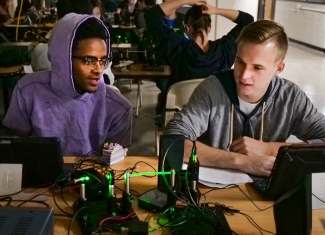Looking for ways to evaluate or transform your physics lab course? We have developed multiple assessment tools including Colorado Learning Attitudes About Science Survey for Experimental Physics (E-CLASS), the Modeling Assessment for Physics Laboratory Experiments (MAPLE), and Survey of Physics Reasoning on Uncertainty Concepts in Experiments (SPRUCE) to help evaluate undergraduate physics lab courses. In addition, we have worked to transform multiple classroom experiences from a large, introductory level course to a junior level lab that focuses on modeling to a completely online course-based undergraduate research experience. In the topics listed below, we provide detailed information about the assessment tools, the course transformation processes, and linked course materials.



 The Physics Frontiers Centers (PFC) program supports university-based centers and institutes where the collective efforts of a larger group of individuals can enable transformational advances in the most promising research areas. The program is designed to foster major breakthroughs at the intellectual frontiers of physics by providing needed resources such as combinations of talents, skills, disciplines, and/or specialized infrastructure, not usually available to individual investigators or small groups, in an environment in which the collective efforts of the larger group can be shown to be seminal to promoting significant progress in the science and the education of students. PFCs also include creative, substantive activities aimed at enhancing education, broadening participation of traditionally underrepresented groups, and outreach to the scientific community and general public.
The Physics Frontiers Centers (PFC) program supports university-based centers and institutes where the collective efforts of a larger group of individuals can enable transformational advances in the most promising research areas. The program is designed to foster major breakthroughs at the intellectual frontiers of physics by providing needed resources such as combinations of talents, skills, disciplines, and/or specialized infrastructure, not usually available to individual investigators or small groups, in an environment in which the collective efforts of the larger group can be shown to be seminal to promoting significant progress in the science and the education of students. PFCs also include creative, substantive activities aimed at enhancing education, broadening participation of traditionally underrepresented groups, and outreach to the scientific community and general public.